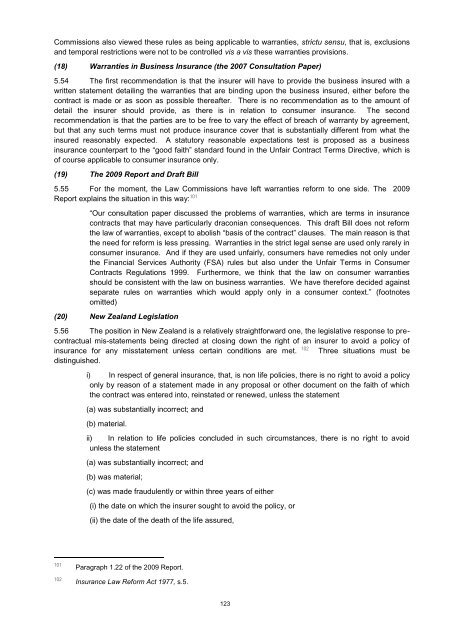Insurance Contracts CP - Law Reform Commission
Insurance Contracts CP - Law Reform Commission
Insurance Contracts CP - Law Reform Commission
Create successful ePaper yourself
Turn your PDF publications into a flip-book with our unique Google optimized e-Paper software.
<strong>Commission</strong>s also viewed these rules as being applicable to warranties, strictu sensu, that is, exclusions<br />
and temporal restrictions were not to be controlled vis a vis these warranties provisions.<br />
(18) Warranties in Business <strong>Insurance</strong> (the 2007 Consultation Paper)<br />
5.54 The first recommendation is that the insurer will have to provide the business insured with a<br />
written statement detailing the warranties that are binding upon the business insured, either before the<br />
contract is made or as soon as possible thereafter. There is no recommendation as to the amount of<br />
detail the insurer should provide, as there is in relation to consumer insurance. The second<br />
recommendation is that the parties are to be free to vary the effect of breach of warranty by agreement,<br />
but that any such terms must not produce insurance cover that is substantially different from what the<br />
insured reasonably expected. A statutory reasonable expectations test is proposed as a business<br />
insurance counterpart to the ―good faith‖ standard found in the Unfair Contract Terms Directive, which is<br />
of course applicable to consumer insurance only.<br />
(19) The 2009 Report and Draft Bill<br />
5.55 For the moment, the <strong>Law</strong> <strong>Commission</strong>s have left warranties reform to one side. The 2009<br />
Report explains the situation in this way: 101<br />
―Our consultation paper discussed the problems of warranties, which are terms in insurance<br />
contracts that may have particularly draconian consequences. This draft Bill does not reform<br />
the law of warranties, except to abolish ―basis of the contract‖ clauses. The main reason is that<br />
the need for reform is less pressing. Warranties in the strict legal sense are used only rarely in<br />
consumer insurance. And if they are used unfairly, consumers have remedies not only under<br />
the Financial Services Authority (FSA) rules but also under the Unfair Terms in Consumer<br />
<strong>Contracts</strong> Regulations 1999. Furthermore, we think that the law on consumer warranties<br />
should be consistent with the law on business warranties. We have therefore decided against<br />
separate rules on warranties which would apply only in a consumer context.‖ (footnotes<br />
omitted)<br />
(20) New Zealand Legislation<br />
5.56 The position in New Zealand is a relatively straightforward one, the legislative response to precontractual<br />
mis-statements being directed at closing down the right of an insurer to avoid a policy of<br />
insurance for any misstatement unless certain conditions are met. 102 Three situations must be<br />
distinguished.<br />
i) In respect of general insurance, that, is non life policies, there is no right to avoid a policy<br />
only by reason of a statement made in any proposal or other document on the faith of which<br />
the contract was entered into, reinstated or renewed, unless the statement<br />
(a) was substantially incorrect; and<br />
(b) material.<br />
ii) In relation to life policies concluded in such circumstances, there is no right to avoid<br />
unless the statement<br />
(a) was substantially incorrect; and<br />
(b) was material;<br />
(c) was made fraudulently or within three years of either<br />
(i) the date on which the insurer sought to avoid the policy, or<br />
(ii) the date of the death of the life assured,<br />
101<br />
102<br />
Paragraph 1.22 of the 2009 Report.<br />
<strong>Insurance</strong> <strong>Law</strong> <strong>Reform</strong> Act 1977, s.5.<br />
123

















